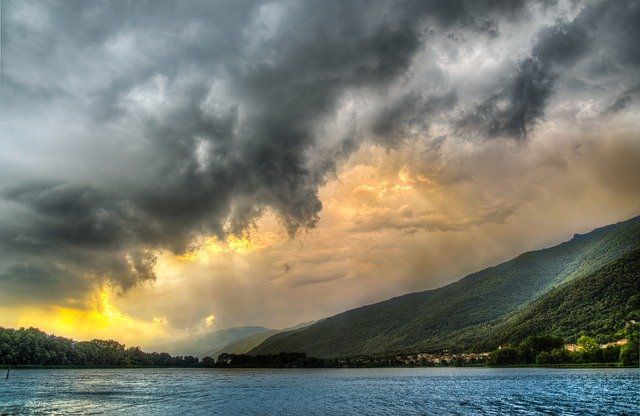
The fact that God is the Creator of all things is the indispensable foundation upon which all other beliefs of Christianity are based. One of the ways we know God is through what we see around us: God is he who made the universe. That is his status. On this affirmation hangs everything we say about him, about the world in which we live, and about our own history, destiny and hope. The most fundamental question of religious thought is: ‘Who is the God in whom we trust?’ And the answer the Bible gives is: ‘He is the maker of the heavens and the earth.’
From Genesis to Revelation Scripture speaks of the creative activity of God. The opening words of the Bible, ‘In the beginning, God created the heavens and the earth,’ declare men live on God’s earth. The prophets are always reminding the people of this: ‘This is what the Lord says – your Redeemer, who formed you in the womb: I am the Lord, who has made all things … who spread out the earth by myself’ (Isaiah 44:24). God’s right to tell us how we should live is based on the fact that we are living in his world. In heaven the theme of its adoration is, ‘You are worthy, our Lord and God, to receive glory and honour and power, for you created all things, and by your will they were created and have their being’ (Revelation 4:11).
So the foundation for a Christian world-view is that matter and energy, form and void are exclusively the creative work of the triune God himself – he and no one else. God did not delegate the work to a seraphim. All its rationality, beauty, dignity, order and goodness reflects his own accomplishment: ‘The heavens declare the glory of God; the skies proclaim the work of his hands’ (Psalm 19:1). So, what are the consequences of the doctrine of creation for a Christian world-view?

Creation is to be enjoyed
First of all, creation is to be enjoyed: ‘God richly provides us with everything for our enjoyment,’ says Paul (I Timothy 6:17). Dr Hans Peter Wagner is the author of the 1982 study Puritan attitudes towards recreation in early seventeenth century New England. Dr Leland Ryken of Wheaton College says that that book has proved that the Puritans enjoyed such varied activities as hunting, fishing, a form of football, bowling, reading, music, swimming, skating and archery ( Worldly Saints, p.3). Oliver Cromwell removed an organ from an Oxford chapel to his own residence in Hampton Court where he employed a private organist. When one of his daughters married, Cromwell engaged an orchestra of forty eight to accompany the dancing (cp. Percy Scholes, The Puritans and Music in England and New England, p.5). When John Bunyan was in prison he made a lute from a chair leg.
This is one aspect of the evangelical world-view. God forbid that it should be exaggerated, but it cannot be ignored. Abraham Kuyper demonstrated in Pro Rege an almost baffling knowledge of all sorts of games, and in addition he pointed out those factors that corrupt them into exhibitions of immorality.

Because Dr Gresham Machen was dismissed by his opponents for his ‘perverse obstinacy’ and for being ‘quite loony’ (Ernest Sandeen in Roots of Fundamentalism), and for having ‘temperamental idiosyncrasies’ (Charles Eerdman’s calumny), his recent biographer D.G. Hart has had to draw the attention of his readers to what a rounded human being Machen was: ‘He liked to spend his first class of every semester loosening the students up with many jokes and “stunts”. In addition to playing tennis with students, Machen also sponsored in his suite at the Princeton or Philadelphia apartment an informal gathering of the “Checker Club” [what Englishmen would call a “Draughts Club”], a time for students to enjoy a game of chess or checkers. When he moved to Philadelphia he often took students to college football games’ (Defending the Faith, p.l31). Machen’s delight in mountain climbing was explained in his essays, ‘Mountains and why we love them’ and ‘The benefits of walking’ (What is Christianity? pp.304-317).
The world and its fullness was made by God, and he continues to uphold and direct it. The future of humanity is not for it to become extinct and for the earth to be swallowed up by the sun. The entire creation is going to be set free from its bondage to sin, renewed and transformed. The universe is not doomed to ruin: it is destined for renewal. So we do not merely mouth words about this being God’s creation-we live it. This is our Father’s world.

The psalmist in Psalm 104 sees God’s creativity and loving care in sky and clouds, meadows and hills, in wild donkeys, mountain goats and lions. He is filled with delight at all that his senses enjoy and he cries, ‘May the glory of the Lord endure for ever; may the Lord rejoice in his works … I will sing to the Lord all my life; I will sing praise to my God as long as l live'(v.31).
Creation is to be trusted
That we can trust the Creator is a great theme of Jesus’ preaching. It is a sin to worry because we are living in our caring Father’s creation. He makes sure the birds have plenty to eat; he clothes a patch of mud with grass. He does this to everything in his humbler creation. But to those who are made in his own image, and have been adopted into his own family, he is under greater obligation to ensure they have everything they require: food to eat, clothes to wear and security for the future. God knows our needs; the Creator will provide.

Modern preachers frequently turn to this theme: ‘Jesus is teaching us here that it is God who has given us the gift of life and being and existence. It is a tremendous conception. We are not merely individuals thrown up or thrown out by an evolutionary process. God is concerned about us one by one. We would never have come into this world if God had not willed it. We must take a firm hold and grasp of this great principle’ (Martyn Lloyd Jones). ‘Our worries would be understandable if we believed that everything in the universe happened by pure chance, that there is no plan for our lives, and that nobody is in charge. But if we believe that the entire universe is God’s creation and that he continues to uphold and direct it, then it is time to stop worrying and start trusting’ (David Feddes).
We might worry about our futures: are we gifted enough to find employment, or to find a partner? When God told Moses to lead his people out of Egypt, Moses said, ‘I’m not qualified. I stammer and stumble over words.’ But God reminded Moses that he was the Creator: ‘Who gave man his mouth? Who makes him deaf or mute? Who gives him sight or makes him blind? Is it not 1, the Lord?’ (Exodus 4:10-11). Our Creator-Shepherd will enable us.

Because this is God’s creation in Christ it can be trusted. Someone has pointed out that this means ‘The creation cannot contain booby-traps. What was made by Christ cannot be malevolent. It is a reliable revelation of God. There can be no ultimate Black Holes because there is no place where the Son’s writ does not run. The Christian researcher goes about his a pantheistic philosophy, and environmental problems are being manipulated to fulfil the aims of the New Age. This is a problem Christian teachers have to face. The answer is not to drop out of caring for the world but to treat it with respect as an entity made by God. We can eat meat and use animal products in order to live, but there is no place for inhumane treatment or the unnecessary destruction of animals. Evangelical Christians from the Puritan period were in the forefront of those deploring bear-baiting and cock-fighting.
When we live the truth of creation, we will treat the earth with care. We will not throw our garbage out of the car window – what would our Creator think? We seek to make the earth productive, and useful, and maintain its beauty.
We emulate the Creator

Fourthly, God created, and has made us in his image. Mankind is unavoidably creative, and God is the Christian’s model: ‘Be imitators of God’ (Ephesians 5:1). The world is full of those things that are true, noble, right, pure, lovely, admirable, excellent and praiseworthy (Philippians 4:8) by a Creator’s will, and so must be our own lives. For the preacher to live the creation means a ban on sermons that are without form and void, characterized by vulgar phraseology and jarring diction-those things that destroy our affirmations of the blessedness of God. For the Christian publisher to live the creation means a ban on closely-printed pages with narrow margins in badly bound books with drab covers and self-righteous promotions. Sermons and books should first be interesting and have some loveliness if they are to persuade the world of its creator Jesus Christ.
Someone has said, ‘In the parables and & discourses of our Lord, in the poetry of Isaiah and David, in the narratives of Luke and in the epistles of Paul, beauty is the handmaid of truth.’ In Bunyan, Rutherford, Pantycelyn, Wesley and Spurgeon creativity is wedded to the theology of redeeming grace. The beauty of our meeting places, their decorative ceilings, the carved pews, their airiness and symmetry speak of lives imitating God. A Christian world-view creates creative lives.
Geoff Thomas









